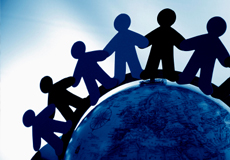Big Data Pioneer Excited About Reinventing Human Society
March 29, 2013
Alex ‘Sandy’ Pentland is one of the world’s most-cited computer scientists and was also named one of the world’s seven most powerful data scientists by Forbes. As a pioneer in Big Data, he discusses his distinctive view of the field, revealing his belief in the power of Big Data to inform about people’s behavior rather than just about their beliefs. Pentland is also interested in how that concept relates to business.
According to Pentland, Big Data is about consumer behavior, along with employee behavior, and how it all relates to individual businesses.
 “It’s not about the things you post on Facebook, and it’s not about your searches on Google, which is what most people think about, and it’s not data from internal company processes and RFIDs. This sort of Big Data comes from things like location data off of your cell phone or credit card, it’s the little data breadcrumbs that you leave behind you as you move around in the world,” he tells Edge.
“It’s not about the things you post on Facebook, and it’s not about your searches on Google, which is what most people think about, and it’s not data from internal company processes and RFIDs. This sort of Big Data comes from things like location data off of your cell phone or credit card, it’s the little data breadcrumbs that you leave behind you as you move around in the world,” he tells Edge.
How do these breadcrumbs differentiate from information posted on social media? They tell the story of your life, according to Pentland. “It tells what you’ve chosen to do. That’s very different than what you put on Facebook. What you put on Facebook is what you would like to tell people, edited according to the standards of the day. Who you actually are is determined by where you spend time, and which things you buy.”
Thus Big Data is increasingly about finding connections between people and what they’re doing, between behavior and outcomes. Big Data provides the possibility of understanding how the growing systems of people and machines work and whether or not they’re stable. “What actually matters is how the people are connected together by the machines and how, as a whole, they create a financial market, a government, a company, and other social structures,” he notes.
In order to take action, “because it is so important to understand these connections,” Pentland and Asu Ozdaglar created the MIT Center for Connection Science and Engineering.
“It’s one of the very first MIT-wide Centers, because people from all sorts of specialties are coming to understand that it is the connections between people that is actually the core problem in making transportation systems work well, in making energy grids work efficiently, and in making financial systems stable. Markets are not just about rules or algorithms; they’re about people and algorithms together,” he explains.
Pentland addresses the need to build new systems based on these modern human/machine connections, but also mentions the privacy risks that come alongside the data. “Since this data is mostly about people, there are enormous issues about privacy, data ownership, and data control. You can imagine using Big Data to make a world that is incredibly invasive,” he adds.
It’s important for Big Data to first answer the key question: Who owns the data in a data-driven society?
But Pentland is excited by the nearly endless possibilities, writing that “if you could see everybody in the world all the time, where they were, what they were doing, who they spent time with, then you could create an entirely different world. You could engineer transportation, energy, and health systems that would be dramatically better.”

No Comments Yet
You can be the first to comment!
Sorry, comments for this entry are closed at this time.